The Greek-Australians 1950's-1970's A Question of Identity
Introduction
" He regarded himself as an Australian and as a Greek. There were no dividing lines. Had he been Greek alone, he would have returned to the country of his birth as soon as he was able. Had he been solely Australian, he would have disregard his inherent sense of family loyalty and married Carol. Kerry Walsh Cirigo (Kythera) A Novel. " (0)
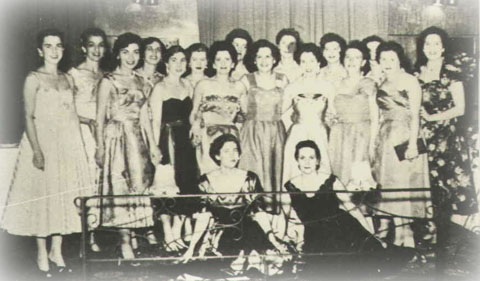
" So read the program of the 25th anniversary ball 1978. The emblem of the Greek Association was the olympian Hestia. The goddess of Hesita as its goddess represented personal security and happiness and the sacred duty of hospitality. In 1951 when the generation of Kytherian mothers and Castilorizians concerned with instilling within their children, the third generation a sense of Greek conscience and peoplehood and assuring that the children married Greeks by involving them orgainsations."> The Greek Young Matrons Association was formed in 1951 by a small group of young Greek Matrons
'Identity', 'endogamy' and 'family loyalty' are the most important issues within the third generation. The early Kytherian and Castellorizan immigrants laid the foundations of 'Greekness'. They inculated within their children, the second generation, an awareness of their Greek heritage and background, not out of loyalty to Greece, but of loyalty to the family. The second generation combined their Greek background with Australian middle-class aspirations and ideas in regard to family organisation, attitudes towards women and most importantly, upbringing of children. In so doing the second generation Kytherian and Castellorizan parents created something 'new'; a distinctive 'Greek-Australian' subculture whose characteristics were not evident in Greece. Although the second generation wrought major structural changes within the traditional Greek family their parents had brought out with them, they still insisted on continuity from one generation to the next. They were not able to retain the Greek language and the Greek religion but they still promoted the idea of endogamy to their children, the third generation were detached from the initial migration experience. "Unlike the first and second generation, members of the third generation, are not preoccupied with ethnic prejudice and discrimination." (1) Born into middle and upper-middle class families, they no longer had a memory of struggle for resources and financial security like their parents. Their contact with Greek culture and
Identity
tradition was largely through their grandparents who encouraged the third generation to join Greek organisations, attend Greek church and marry endogamously. The grandparents were a major formative influence in the lives of the third generation. They were the preservers of Greek tradition amongst the different generations of Greeks within Australia.
'Identity' was an important aspect in the lives of the third generation. The third generation were not particularly aware of themselves as 'Greeks' for they had not been required to live in two distinct worlds like their parents. The second generation Kytherian and Castellorizan parents were conscious of the dual nature of the existence, however their children, the third generation could not divide the two cultures. The Anglo-Saxon and Greek culture had cemented together and become one. "I don't distinguish the two things. I mean it's all part of the one thing... Do I feel particularly Greek? No, it's just part of life, I mean it's not separate..." (2) explained an eighteen year old third generation Kytherian girl. The third generation felt this way because they had not been expected to speak 'Greek' at home like their parents, nor did they lead a totally Greek social life.
" I'm more Australian than a Greek... 'cause I've been born here and my parents were, my ways have been changed a bit to Australian... I'm third generation, so I'm not really into the real Castellorizans or the real Greeks from Greece, you know, I'm more with the Australian born Greeks or Australians. I've been brought up with Australians. With Dad, he was speaking Greek at home, they were all Greek at home and Greek friends came over and Greek young people, that's the circle he grew up in. " (3)
In America, George Kourvetaris observed that "the third generation Greek Americans think primarily as Americans and expect to be treated as such." (4) The Greek-Australian third generation have similar expectations. However, although they identify to a certain extent with the Australian culture, they are still aware of their (unspoken) obligations towards the Greek family.
Education
Apart from the issue of identity, the third generation were different from their second generation parents in many other ways, particularly in regard to education. Their distance from the original migrant experience made the third generation more complacent and less ambitious than their parents. The third generation Kytherian and Castellorizan children who were interviewed were not adamant about joining the professions. They were mainly spurred towards educational advancement by their parents who emphasized the benefits of self-employment to their children. 'Jeffrey Andrews', a fifteen year old third generation Castellorizan, born in Sydney in 1963 and who is still attending high-school, oscillates between different positions about his future: from a desire to leave school in fourth form to a position where he is prepared to become a tradesman. Now he maintains that he wants to "...go into commerce, business management or work in a company; if you're an accountant you can go higher... I could open up my own business or company." (5) Meanwhile 'Jeffrey's' sister was quite happy to finish school in fourth form and become a secretary, to her parents' disappointment.
Fifteen year old, third generation Kytherian 'Maria Coronias', unlike 'Jeffrey', attended a private school and explained
" ...my father wants me to follow in his footsteps and be an optometrist, and work hard and go to university and take over his job and everything, mum is sort of pushing it because dad wants it and I feel I sort of have to do what he wants... I want to be a sports teacher. But that's been strongly advised against because when you get old you'll be like that, and it's just a 9-5 job and the income is nowhere near as good, and things like that. " (6)
Her sister 'Suzanne Coronia', eighteen, has just finished sixth form and would be content like her sister to become a teacher. She explains she would like to become either a "Kindergarten teacher or an air-hostess". However, "dad would like me to go to university, I've applied but I don't think I'll go, I wouldn't work, I don't think I'll do well enough work if I went." (7) On the other hand, third generation, eighteen year old Castellorizan 'Theo Politis' agreed with his parents' suggestions for further education and explains that "...they've promoted the idea to be good in my mind but I would like to go on to further education, so maybe it's got something to do with that..." (8) While his sister, twenty-one year
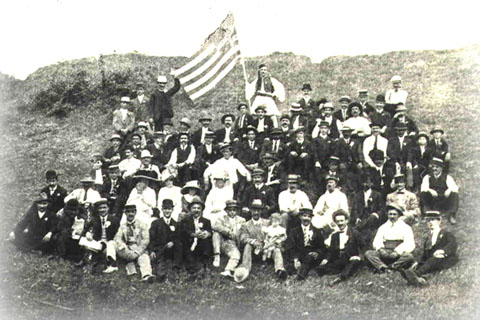
Greek Picnic: Brisbane 1916
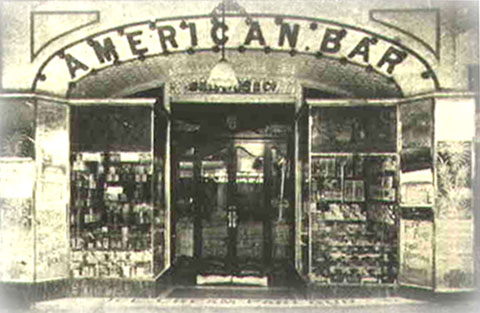
Greek shop owned by Kytherian George Sklavos: 1916 Brisbane
old 'Veronica Politis', like 'Jeffrey's' sister, finished fourth year high school and became a secretary. This initially disappointed her parents, "but after a while they accepted the idea, actually with my result, it wasn't that good, I only had ordinary pass marks and my mother knew I wasn't... actually I'm lazy, I didn't like to study, so they accepted it." (9) 'Irene Pandos', twenty-five, a third generation Castellorizan, was the only person married out of the third generation children who were interviewed. 'Irene' was a town-planner and was an extremely ambitious and career orientated young woman which was quite unusual amongst the third generation who were interviewed.
The impetus for advancement witnessed within the second generation was not displayed by their children. The second generation had a different upbringing from their children. Theodore Saloutos discussing the second generation in America who reached maturity between he first and the Second World War, explains,
" The early years in the lives of children born of immigrant parents were hardly joyous ones, for they were exposed to the realities of life at a tender age. They heard parents and their friends tell of their hardships in Greece and the early years in the United States, the unemployment, discrimination and difficulties with the language. They were told in clear and often blunt language that their principal purpose in life was not to have fun, but to work, take advantage of the opportunities denied their parents, assume responsibilities, make a success of themselves... " (10)
The second generation in Australia growing up at the same time, had similar experiences to their American counterparts; and they made sure that their children did not experience the hardship they had to undergo as children growing up in a Geek family in Australia. One second generation Castellorizan parent born in Sydney in 1926 explained,
" ...when I was a kid we had nothing, not a penny - we used to get a penny, we used to scrub a whole shop, a whole house to get a penny and go and buy a penny of broken biscuits. When I got married I said no way are my children ever going to see this - I'm going to give my kids, I don't care if I'm broke, everything they want. " (11)
Third Generation
The third generation were not deprived of an education but were encouraged to pursue a professional career if they so wished; neither were they deprived of material goods; hence they did not strive particularly for educational advancement or financial security as their parents had. Their parents tried desperately to 'push' them towards professional careers in the hope of attaining higher status for the family but this was very difficult with children who had not experienced 'struggle'. The second generation parents had a level of maturity and perception of their own situation as a result of being exposed to hardship and responsibility from an early age which was not equaled by their third generation children who had been protected. (12)
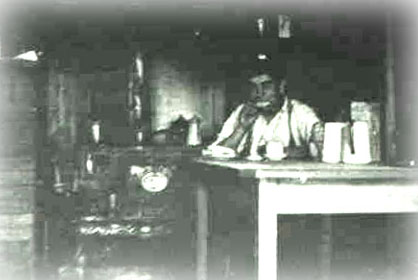
Kytherian store at Woodburn 1922/23
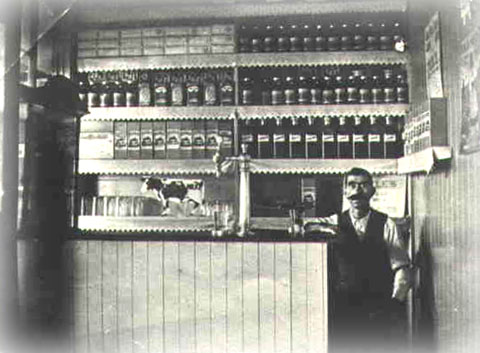
Kytherian store at Woodburn
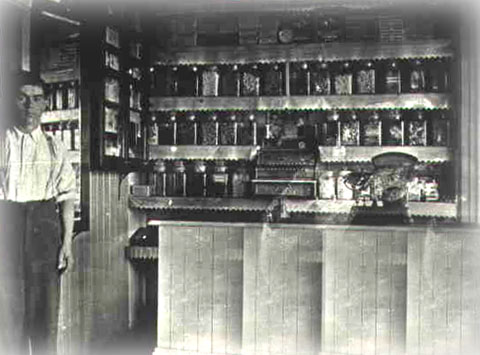
Kytherian store at Woodburn
American Third Generation
The second generation parents had made life easier for their children. One third generation Castellorizan girl born in Sydney in 1957 explains "they had a harder life, we have it easier, my parents have worked hard for us, made it a lot easier for us". (13)
The third generation Kytherian and Castellorizan children strongly resembled the children of the middle-class Australian parents. In America however the situation was different in regard to educational advancement amongst third generation Greeks. G. Kourvetaris found that
" Both education and professional achievement are highly valued among members of the third generation. In an empirical and comparative study of six ethnic groups, it was found (Rosen, 1959; 47-60) that a high level of aspiration and achievement exists among members of third generation Greeks. " (14)
The difference between the Australian and American third generation can be partly explained by the fact that the third generation Kourvetaris is referring to is an earlier generation which reached maturity in the 1940's. Furthermore the difference can be attributed mainly to the difference in attitude to education in the American and the Australian culture. In America there is a lot of pressure on children to attend a college if not a university after graduating from high school whereas the same attitude does not prevail in Australia, if anything there is a strong anti-intellectual trend within the society. While within the Greek community in Australia amongst the first generation it is considered very prestigious for children to attend university; but this attitude does not extend to the third generation.
Apart from attitudes towards education, the Australian and American third generation Greeks also differ in other areas. George Kourvetaris points out that in America "...one finds little or no interest among members of the third generation in maintaining the ethnic institutional aspects of Greek culture such as language, family traditions, and endogamous marriages." (15) But these findings do not apply to Australia, at least not in regard to the people interviewed for this historical study of the Greek family in Australia. Although many of the third generation had
Family Traditions
not learnt the Greek language, they regretted not having done so and wanted their children to learn it. One third generation Castellorizan boy born in Sydney in 1960 explains that if he has children: "I wouldn't mind them learning the Greek language because I've regretted that I haven't learnt it when I was young." (16)
Many of the third generation felt that it was useful having a second language and have attempted to learn Greek in their later years by taking a modern Greek course at the Institute of Languages at the University of N.S.W. A young third generation Castellorizan girl explains that "I can't speak Greek very well... I can understand it more than I can speak it... That's why I went to the Institute of Languages to learn." (17)
Also in regard to 'family traditions' the third generation of Greek-Australians differed from their American counterparts. In Australian Greek 'family tradition' the third generation are maintained by the grandparents. They become of major importance to the third generation. Culture and Greek traditions are retained for the sake of the grandparents. Many of the third generation attended Greek church though "always with my grandparents... I used to go to Sunday school and Greek Church every Sunday". (18) Some even went as far as saying that even if they married an Australian they would still go to church "I think I'd go Christmas with my grandparents and say Easter just for them." (19) The third generation Kytherian and Castellorizans had close contact and high regard for their grandparents and made an effort to visit them regularly independent of their parents. "Well lately, since I've been on holidays I see them three times a week, maybe four times a week... I enjoy their company and they enjoy my company and they're good people." (20)
Greek Young Matrons' Association
The grandparents exerted a strong control over the third generation and usually influenced them into becoming involved in Greek organisations and activities such as the sports groups for youth, organised by the Castellorizan club, activities for youth conducted by the Kytherian organisation and especially in organisations such as AHEPA and the Greek Young Matrons' Association. One young third generation Kytherian girl born in Sydney in 1960, 'Suzanne Coronias' admitted that "...well sometimes I don't want to go but my grandparents encourage me to go and mum". (21) The second generation parents also strongly encourage their children to attend these organisations because "...it would please my grandparents." (22)
The involvement of the third generation in these organisations pleased the grandparents and parents because it meant that the third generation were socializing within a Greek circle and might meet possible Greek marriage partners. The formation of the Greek Young Matrons' Association in particular was an overt attempt by second generation parents to ensure that their children married Australian born Greeks like themselves by providing them with an organisation which would offer social activities and cultural events in which young Greek people could participate. (23) The Greek Young Matrons' Association organised
" ...a number of children's concerts, performed in the Greek language ...significantly inspiring the children to take an interest in their cultural heritage. At the same time debates were organised in which many of the teenagers participated. " (24)
The association also has an annual Ball at which young Greek girls of the second and third generation can make their debut and become known, and possibly seen and selected by an appropriate Greek Australian male. The organisation is mainly made up of upper middle and middle class Kytherian second generation women as well as second generation Greeks from other parts of Greece.
Participation in this organisation meant that their children would not only marry an Australian born Greek but probably a person from a similar social class.
Although both the Kytherian and Castellorizan third generation children had close contact with their grandparents and attended some Greek functions for the sake of their grandparents and parents, they also differed between themselves. The third generation Castellorizan children whose parent shad experienced prejudice and status and made up the Australian middle and lower middle classes; tended to be concerned and more aware of ethnicity and Greek culture. Whereas the third generation Kytherian children whose parents had been brought up in the New South Wales country towns, where they had been usually accepted b the local towns people, and one or the other of the second generation Kytherian parents had a university education and constituted the upper middle and middle classes in Australia; were usually less concerned by 'Greekness' and things Greek. The third generation Kytherian children noticed the difference in attitude between themselves and the other children who attended the social functions of organisations such as AHEPA. (25)
" ...the kids there that we meet consider themselves very Greek... everything they do you know like everything is done very 'Greekly'... they feel strongly about Greece, like somebody was talking about Greece, 'Oh yes, Greece, it is the best country in the world, it is beautiful, it's wonderful, we should all live there', and things like that... I think we have got much more of an Australian life style in our lives than theirs, theirs is much more Greek than ours. " (26)
G Kourvetaris found in his study of three generations of Greeks in America that "The more assimilated a member in the third generation, the higher his socio-economic status," (27) which also would apply in Australia. However it seems that it is not just 'assimilation' which causes changes in attitude amongst the third generation but also their membership of a particular class which influences their behaviour and causes them to be less preoccupied with ethnicity.
" As a rule, members of the third generation have incorporated the value, attitudes and norms of the American middle and upper middle class subcultures. Social class in more important to them than ethnicity. " (28)
Even though the third generation Kytherian and Castellorizan children differed in their degree of commitment to Greek culture, both groups of third generation children supported endogamy. It was their 'inherent sense of family loyalty' which made both Kytherian and Castellorizan third generation favor marrying a Greek. Like the second generation who had "the advantages of having a wife of the same faith, capable of conversing in the native tongue of the parents and discharging her true duties to the family" emphasized by their first generation parent told them and "warned of the dangers of mixed marriage, the loss of... Hellenic identity..." (29) the third generation also had the problems involve din intermarriage stressed to them by their second generation parents. One young third generation Castellorizan boy aged fifteen explained
" ...I think it helps in a way if you marry a Greek girl because as Dad was saying before... it's complications sometimes later on... If you've got to love a Catholic in a Catholic Church, but you've always wanted to marry in a Greek church... and when it comes to going to functions and that... when you've involved with Greek people, Greek speaking people, it's a bit hard to for the person to, you know, sort of get into the conversation when they can't speak... " (30)
Although the third generation maintain that it is preferable to marry a person of Greek origin for the sake of the family "you have something in common with a Geek girl, there's more for marriage, there's more changes of it being a success... common background and common interests" (31) unlike their parents they were not adamant about it and added "I'd marry whatever guy appeals to me... I'll probably will marry a Greek... I'd like to, but I'm not just going to go after guy just because he's Greek, whatever, if a guy comes to me and is a nice Australian guy..." (32) Like their second generation fathers before them, the third generation children were influenced by the Australian or western romantic tradition where a person marries because of love but whether they would ultimately marry outside their culture is a separate issue.
The only person who was married amongst the third generation who were interviewed as 'Irene Pandos', twenty-five years old, a third generation Greek Australian, a town planner; described the type of life she was leading when she was younger and single as 'Australian' and who "used to bring home Chinese, Jewish, Australian boys, whomever I liked at the time;" (33) married a second generation Kytherian boy. Although she led an 'Australian' single life, once married, she maintained,
" ...I would say I'm quite prejudiced, I don't really think that intermarriages should occur if someone wants to keep their culture because each time I've seen it happen, the Greek always loses his, the Australian never comes into the Greek culture... My cousins who have got one parent Greek and one parent Australian are not Greek, they don't think like Greeks, they don't act like us, they don't regard themselves as Greek, that is the most important thing. " (34)
It appears that once married the third generation regress and adopt the traditional Greek attitudes or they maintain a certain continuity in attitude with their grandparents, depending on the way one looks at it. However 'Irene Pandos'' response may be atypical of the third generations' attitude but until further research has been conducted amongst a large group of married third generation couples one cannot be sure. George kourvetaris, in a study of "Patterns of Generational Subculture and Intermarriage of the Greeks in the United States" has made some tentative propositions such as "there is more intermarriage in the middle and upper middle class third generation Greek Americans than among upper or lower extremes of an ethnic stratification system." (35) One cannot be sure if the same applies to Australia since no statistics exist on intermarriage amongst the third generation however the proposition is an interesting one and should at least be considered.
Apart from the existence of 'continuities' such as preference for endogamy between the different generations of Greeks in Australia there have also been major structural changes between the second and third generation particularly in regard to Greek morality. Many third generation Greek girls no longer feel compelled to remain virgins in order for a marriage to take place; but maintain that sexual relations are permissible as long as love is present and marriage is to follow. (36) A third generation Castellorizan girl born in Sydney in 1957 describes the type of morality which prevails amongst the third generation in the late 1970's -
Sexual Relations
" I feel that if a girl loves a boy and she's gone out with him for a while, it, I don't know, I'll just say it would be okay to have intercourse, but then if he loves her he should really want... but then they might not be prepared financially and they might not be able to afford to get married. You don't sleep with every Tom, Dick and Harry. " (37)
But the third generation Greek men are not as 'liberated' as the Greek women in regard to Greek morality. This difference between third generation girls and boys is not unusual for it is also found nit he wider Australian community. Although many middle class Australian women have changed their attitude to morality, many of the middle class Australian men still feel the same way as many of the young third generation Greek boys who assert that,
" If a woman is a virgin or not before she is married, well, it shouldn't make a great deal of difference but if she is cheap, well you know... well if she plays around with a lot of men... Personally, I'd like to marry a virgin... because it is a sign that a girl has not been around with other men. " (38)
Thus by the third generation there is the formation of a distinct and definite 'Greek Australian' subculture where Greek and Anglo Saxon life styles have merged so thoroughly that they cannot be divided in the mind of the third generation. Besides this cultural merger there has also been a desire for endogamy amongst the third generation, out of inherent loyalty to the Greek family and particularly to their grandparent who were very important influences in their lives. Although continuities existed, changes have also been wrought between the second and third generation I regard to attitudes toward education and career and attitudes toward Greek morality. These changes have not been caused by a movement away from the core of Greek culture from one generation to the next but mainly by the influence of class position upon the children of the second generation.
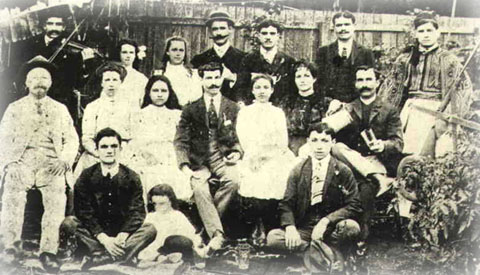
Greek Picnic Lismore N.S.W. 1916
